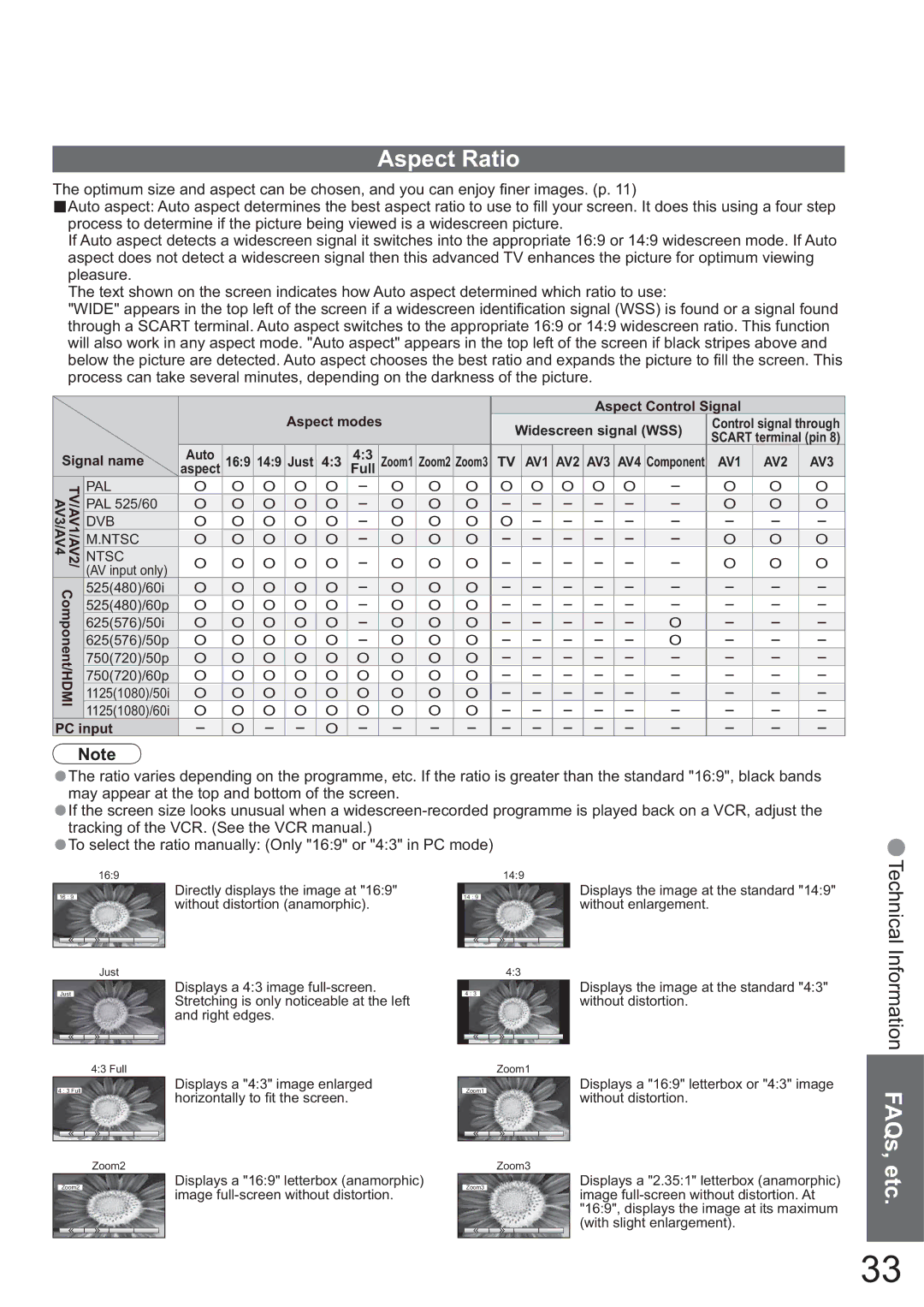
Aspect Ratio
The optimum size and aspect can be chosen, and you can enjoy fi ner images. (p. 11)
ŶAuto aspect: Auto aspect determines the best aspect ratio to use to fi ll your screen. It does this using a four step process to determine if the picture being viewed is a widescreen picture.
If Auto aspect detects a widescreen signal it switches into the appropriate 16:9 or 14:9 widescreen mode. If Auto aspect does not detect a widescreen signal then this advanced TV enhances the picture for optimum viewing pleasure.
The text shown on the screen indicates how Auto aspect determined which ratio to use:
"WIDE" appears in the top left of the screen if a widescreen identifi cation signal (WSS) is found or a signal found through a SCART terminal. Auto aspect switches to the appropriate 16:9 or 14:9 widescreen ratio. This function will also work in any aspect mode. "Auto aspect" appears in the top left of the screen if black stripes above and below the picture are detected. Auto aspect chooses the best ratio and expands the picture to fi ll the screen. This process can take several minutes, depending on the darkness of the picture.
Aspect modes | Aspect Control Signal | |
Widescreen signal (WSS) | Control signal through | |
| SCART terminal (pin 8) | |
|
| |
Signal name
TV/AV1/AV2/ AV3/AV4 | PAL | |
PAL 525/60 | ||
| ||
| DVB | |
| M.NTSC | |
| NTSC | |
| (AV input only) | |
Component/HDMI | 525(480)/60i | |
525(480)/60p | ||
|
625(576)/50i
625(576)/50p
750(720)/50p
750(720)/60p
1125(1080)/50i
1125(1080)/60i
PC input
Auto | 16:9 | 14:9 | Just | 4:3 | 4:3 | Zoom1 | Zoom2 | Zoom3 | TV | AV1 AV2 AV3 AV4 Component | ||
aspect | Full | |||||||||||
O | O | O | O | O | - | O | O | O | O O O O O - | |||
O | O | O | O | O | - | O | O | O | - | - - - - | - | |
O | O | O | O | O | - | O | O | O | O | - - - - | - | |
O | O | O | O | O | - | O | O | O | - - - - - | - | ||
O | O | O | O | O | - | O | O | O | - - - - - | - | ||
O | O | O | O | O | - | O | O | O | - - - - - | - | ||
O | O | O | O | O | - | O | O | O | - - - - - | - | ||
O | O | O | O | O | - | O | O | O | - - - - - | O | ||
O | O | O | O | O | - | O | O | O | - - - - - | O | ||
O | O | O | O | O | O | O | O | O | - - - - - | - | ||
O | O | O | O | O | O | O | O | O | - - - - - | - | ||
O | O | O | O | O | O | O | O | O | - - - - - | - | ||
O | O | O | O | O | O | O | O | O | - - - - - | - | ||
- | O | - | - | O | - | - | - | - | - - - - - | - | ||
AV1 | AV2 | AV3 |
O | O | O |
O | O | O |
- | - | - |
O | O | O |
O | O | O |
- | - | - |
- | - | - |
- | - | - |
- | - | - |
- | - | - |
- | - | - |
- | - | - |
- | - | - |
- | - | - |
Note
•The ratio varies depending on the programme, etc. If the ratio is greater than the standard "16:9", black bands may appear at the top and bottom of the screen.
•If the screen size looks unusual when a
•To select the ratio manually: (Only "16:9" or "4:3" in PC mode)
•
16:9
14:9 |
16 : 9
Directly displays the image at "16:9" without distortion (anamorphic).
14 : 9 |
Displays the image at the standard "14:9" without enlargement.
Just
4:3 |
Just
Displays a 4:3 image
4 : 3 |
Displays the image at the standard "4:3" without distortion.
4:3 Full
Zoom1 |
4 : 3 Full
Displays a "4:3" image enlarged horizontally to fi t the screen.
Zoom1 |
Displays a "16:9" letterbox or "4:3" image without distortion.
Technical Information FAQs,
Zoom2
Zoom3 |
Zoom2
Displays a "16:9" letterbox (anamorphic) image
Zoom3 |
Displays a "2.35:1" letterbox (anamorphic) image
etc.
33
